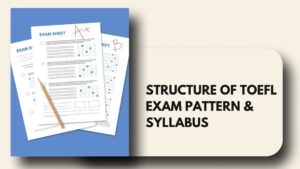The IELTS Speaking test is a face-to-face interview with an examiner that typically takes 11-14 minutes and is divided into three distinct parts. Understanding the structure and preparing for potential topics is crucial for success.
-
Test Structure and Breakdown
- What to Expect
- Specific Part 1 Questions:
- Part 2: Long Turn (3-4 minutes)
- What to Expect
- Part 3: Discussion (3-4 minutes)
- What to Expect
- Common Discussion Topic Areas:
- Comprehensive Preparation Strategies
- Language Skills
- Practice Techniques
- Common Mistakes to Avoid
- Final Preparation Checklist
- Scoring Criteria
- Band Score Breakdown
- IELTS Bootcamp By AdmitX

Test Structure and Breakdown
What to Expect
- Personal questions about familiar topics
- Designed to make you feel comfortable
- Personal
- Typical Topic Areas: Personal Information
- Family
- Home/Hometown
- Work or Study
- Hobbies and Interests
- Typical Topic Areas: Personal Information
Specific Part 1 Questions:
Family
- Can you tell me about your family?
- Do you have any siblings?
- What do your parents do for a living?
- How often do you spend time with your family?
Work/Study
- What do you do? (Are you working or studying?)
- Why did you choose your current field of study/work?
- Do you enjoy your current job/studies?
- What are your future career plans?
Home
- Where are you from?
- Tell me about your hometown
- Do you live in a house or an apartment?
- What do you like most about where you live?
Hobbies and Interests
- What do you like to do in your free time?
- Do you have any interesting hobbies?
- How did you become interested in this hobby?
- Would you like to try any new activities?
Technology
- Do you use social media?
- What’s your favorite device?
- How important is technology in your daily life?
- Do you prefer communicating online or in person?
Food and Cooking
- What’s your favorite type of food?
- Can you cook?
- Do you enjoy trying new cuisines?
- What’s a special dish from your country?
Tips for Part 1
- Give full, detailed answers (not just yes/no)
- Speak naturally and confidently
- Provide examples when possible
- Practice quick, spontaneous responses
- Aim for 2-3 sentences per answer
Part 2: Long Turn (3-4 minutes)
What to Expect
- Cue card task
- 1 minute preparation time
- 1-2 minutes speaking time
- Must speak about a specific topic continuously
Common Part 2 Topic Categories:
1. People
- Describe an important person in your life
- Talk about a family member
- Describe a friend
- Talk about a person you admire
2. Places
- Describe your hometown
- Talk about a place you’ve visited
- Describe your favorite room
- Discuss a tourist destination
3. Objects
- Describe a useful electronic device
- Talk about a gift you received
- Discuss a piece of clothing
- Describe a book or movie
Experiences
- Describe a memorable event
- Talk about a challenge you overcame
- Discuss a time you learned something new
- Describe a travel experience
Common Part 2 Topic Categories with Specific Cue Card Examples:
1. People Cue Cards
- “Describe an important person in your life” Cue card might say: You should say:
- Who this person is
- How you know them
- Why they are important to you And explain how this person has influenced your life
- “Describe a person who gave you good advice” Cue card might include:
- Who gave you the advice
- What the advice was
- How you applied this advice And explain why this advice was particularly helpful2.
2. Places Cue Cards
- “Describe a place you would like to visit” You should explain:
- Where this place is
- Why you want to visit
- What you know about this place And describe what you would do if you went there
- “Talk about an interesting building you’ve seen” Explain:
- Where the building is located
- What makes it special
- When you saw it And describe your feelings about the building
3. Objects Cue Cards
- “Describe a gift you received that was important to you” You should say:
- What the gift was
- Who gave it to you
- When you received it And explain why this gift was so meaningful
- “Describe a useful electronic device” Discuss:
- What the device is
- How you use it
- Why it’s important to you And explain how it helps you in your daily life
4. Experiences Cue Cards
- “Describe a memorable event in your life” You should explain:
- What happened
- When and where it occurred
- Who was involved And describe why this event was so memorable
- “Talk about a time you learned something new” Discuss:
- What you learned
- How you learned it
- Why you wanted to learn this skill And explain how this new knowledge has been useful
Tips for Part 2
- Use the 1-minute preparation time effectively
- Make notes on the cue card
- Structure your talk with an introduction, main points, and conclusion
- Practice timing yourself
- Speak continuously without long pauses
- Include personal details and examples
Part 3: Discussion (3-4 minutes)
What to Expect
- Abstract and complex discussions
- Linked to Part 2 topic
- Assess ability to discuss complex ideas
Common Discussion Topic Areas:
1. Society and Culture
- Generational changes
- Social media impact
- Education systems
- Work-life balance
- Cultural traditions
2. Technology
- Digital communication
- Artificial intelligence
- Environmental technology
- Impact of smartphones
- Future technological developments
3. Environment
- Climate change
- Sustainability
- Urban vs. rural living
- Conservation efforts
- Environmental policies
4. Education
- Learning methods
- Online vs. traditional education
- Importance of lifelong learning
- Global education trends
- Skills for future careers
5. Global Issues
- Globalization
- Economic challenges
- Cultural diversity
- Migration
- International cooperation
Common Discussion Topic Areas with Specific Questions
1. Society and Culture Potential Discussion Questions:
- How has social media changed communication in your country?
- Do you think traditional culture is disappearing in the modern world?
- What are the biggest differences between generations today?
- How important are family traditions in modern society?
- Can social media bring people together
- or does it create more division?
2. Environment Potential Discussion Questions:
- How serious is the problem of climate change
- What can individuals do to protect the environment?
- Are governments doing enough to address environmental issues?What are the advantages and disadvantages of urban living?
- How can technology help solve environmental problems?
3. Education Potential Discussion Questions:
- Is online learning as effective as traditional classroom learning?
- What skills are most important for success in the modern world?
- Should education be free for everyone?
- How has education changed in the last decade?
- What makes a good teacher?
4. Global Issues Potential Discussion Questions:
- What are the benefits and challenges of globalization?
- How can countries work together to solve global problems?
- Is migration a positive or negative phenomenon?
- What are the biggest challenges facing the world today?
- How do cultural differences impact international relations?
Tips for Part 3
- Demonstrate critical thinking
- Use complex sentence structures
- Show ability to agree, disagree, and analyze
- Provide reasoned arguments
- Use advanced vocabulary
- Demonstrate nuanced understanding
Comprehensive Preparation Strategies
Language Skills
- Expand vocabulary
- Practice pronunciation
- Develop fluency
- Learn idiomatic expressions
- Work on grammatical accuracy
Practice Techniques
- Mock interviews with native speakers
- Record yourself speaking
- Use online IELTS practice platforms
- Watch English media
- Join conversation group
Common Mistakes to Avoid
- Memorizing answers
- Speaking too quickly or slowly
- Using very simple vocabulary
- Not listening carefully to questions
- Getting nervous and losing focus
Final Preparation Checklist
- Understand the test format
- Practice all three parts
- Build confidence through consistent practice
- Learn from your mistakes
- Stay calm and composed
Scoring Criteria
Examiners assess you on:
- Fluency and coherence
- Lexical resource (vocabulary)
- Grammatical range and accuracy
- Pronunciation
Band Score Breakdown
- 9.0: Native-like proficiency
- 7.0-8.5: Very good, advanced user
- 5.0-6.5: Intermediate proficiency
- Below 5.0: Limited proficiency
IELTS Bootcamp By AdmitX
AdmitX’s IELTS Bootcamp offers a focused and efficient path to your target score. This 14-hour program packs a powerful punch with:
- 67 concise video lessons: Expert trainers break down each module (Listening, Reading, Writing, and Speaking) into bite-sized, easy-to-digest chunks.
- 17 targeted assignments & 7 quizzes: Test your understanding and identify areas for improvement with a variety of exercises.
- 13 interactive activities: Engage with the material and reinforce key concepts through hands-on learning.
- 5 full-length mock tests: Simulate the real exam experience and receive detailed feedback to pinpoint your strengths and weaknesses.
- Community support: Connect with fellow IELTS aspirants, share your progress, and get your questions answered by experienced mentors.
Beyond the curriculum, you’ll gain:
- Proven test-taking strategies: Master time management, tackle challenging questions, and maximise your score.
- Personalised guidance: Receive expert feedback on your writing and speaking skills to boost your confidence.
- Clear explanations & text summaries: Easily review key concepts and consolidate your learning.
















